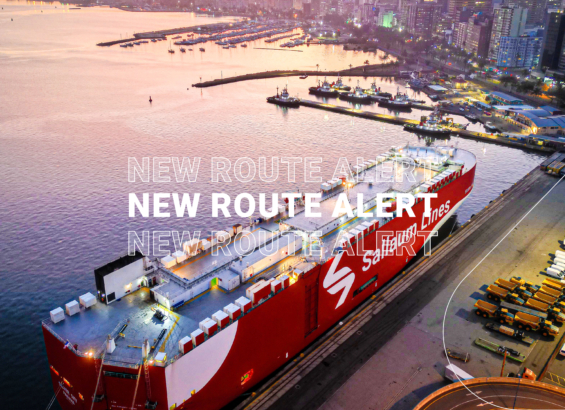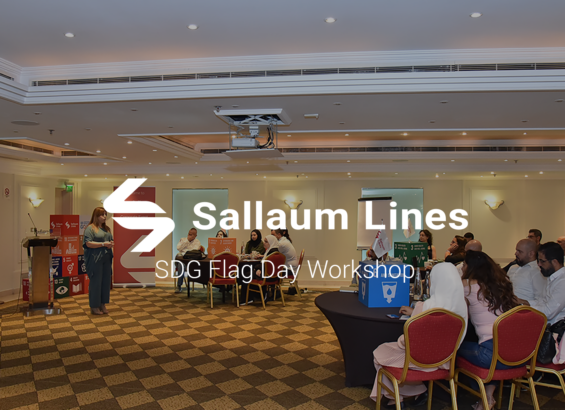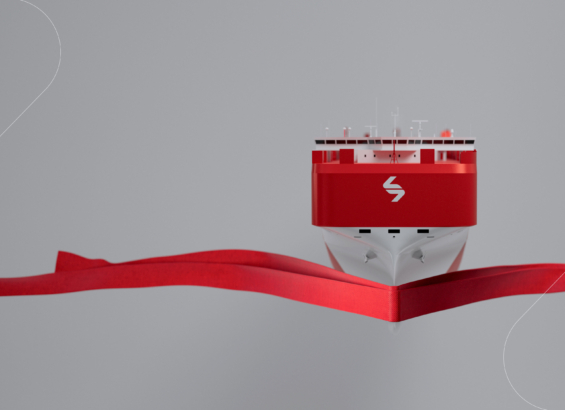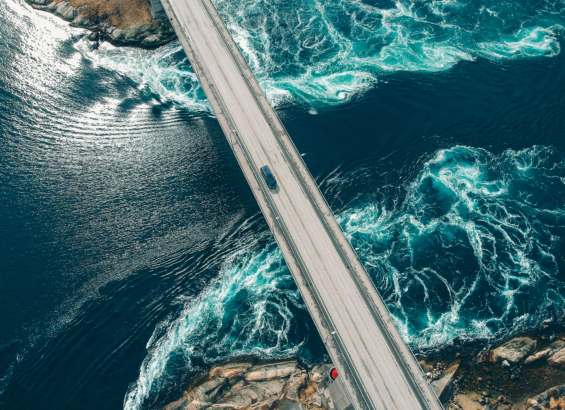Blogs, Sustainability
Environment: Environmental Actions and Commitments
Protecting the Environment in Day-to-Day Operations
Sallaum Lines has joined the world’s largest corporate sustainability initiative – the United Nations Global Compact – that places businesses as a force for the common good. Our business approach aligns with this UN mission. We endorse its ten principles on human rights, labour, environment, and anti-corruption. We take this obligation and responsibility very seriously in conducting a responsible and transparent business. Sallaum Lines ensures that the people, environment and marine life are protected and considered in our strategy and day-to-day operations.
Here are our top environmental tools, solutions, and activities implemented so far:
Energy Conservation and Emission Reduction
When we talk about the energy our vessels utilise, we talk about energy savings and reducing harmful emissions. We have started fitting our vessels with the latest technologies and solutions to meet the regulatory energy and emission standards that aim to preserve the environment and marine life. Additionally, we have developed medium and long-term schemes and annual plans for energy conservation and fewer emissions, which are discussed in regular meetings. We are always looking for new “green” ways in our shipping operations, with a final target of O carbon emissions by 2050.
Using Cleaner Fuels
On January 1st, 2020, the IMO’s Marine Environment Protection Committee decided that the sulphur level in fuel oil that ships transport worldwide cannot exceed 0.5%. That limit is even lower for specific control areas and goes below 0.1%. Therefore, ships need to have desulphurisation equipment, or they will be prohibited from carrying fuel oil with excessive sulphur content, as decided by the IMO.
We strictly abide by these regulations and implemented allowed sulphur limits. We believe this is our daily, active contribution to the overall CO2 emissions reduction that leads to a greener and safer planet. For now, we mainly use low-sulphur fuel oil. However, as described in the next paragraph, we are experimenting with other compliance methods, such as installing desulphurisation towers on diesel engines.
Sox Scrubbers
Burning fossil fuels in diesel engines create toxic sulphur oxide (SOx) emissions that harm the environment and can damage our health. So shortly after the IMO established a global SOx cap at 0,5% in 2021, we installed the first SOx scrubber. It’s an exhaust gas cleaning system (EGCS) used to remove harmful elements from exhaust gases through a cloud of water. Scrubbers are proven to produce cleaner air, improve fuel quality, and positively impact human health.
Sonihull Ultrasonic Anti-Fouling Systems
We make sure our vessels are fitted with the Sonihull Ultrasonic Anti-Fouling System. It provides a complete range of fit-and-forget antifouling solutions for any solid surface exposed to raw seawater. Sonihull is a game changer in marine life protection with its zero-environmental impact system. It enables shipping companies and their vessels to avoid the leaching of poisonous biocides and the shedding of micro plastics. The Sonihull system generates multiple bursts of ultrasonic energy in a range of targeted pulse frequencies, which protects the surface from bio fouling.
Carbon Emission Calculator
As we march towards our carbon-neutral future, we are particularly proud of our new computer-based tool – the carbon emission calculator. It estimates CO2 emissions, so customers can easily calculate carbon dioxide emissions through out the supply chain and take action when they approach the allowed limit. This tool demonstrates our firms commitment to improving operations with better energy efficiency and less CO2 emissions.
Fuel Optimizer
To meet the demands of the IMO’s upcoming Energy Efficiency Existing Ship Index (EEEXI) framework, we are installing FuelOpt in our fleet. This user-friendly system delivers direct, real-time propulsion optimization, resulting in greater energy efficiency and lower fuel costs. Through direct control of the main engine and propeller in changing environmental and loading conditions, FuelOpt ensures that propulsive power remains optimal, based on the commands from the bridge. This offers steady and predictable propulsive power while prioritising a reduction in fuel consumption and emissions – unlike the default propulsion systems on board most ships. In addition, FuelOpt removes costly variations in speed and power caused by human operational factors, which helps avoids overconsumption of fuel, particularly in harsh sea and weather conditions. Over time, this technology should reduce fuel consumption and CO2 emissions by up to 15% and provide an ideal pathway to compliance with incoming EEXI regulations.
Shore Power at Berth
Another solution at Sallaum Lines that aims to ensure cleaner air and waters with less harmful emissions, is connecting our vessels to the grid and using shore power at berth. When plugged into the land power source, vessels can shut down their engines, a tactic proven to eliminate up to 90% of emissions.
Ship Dynamic Deceleration Plan
In 2018, we adopted a deceleration plan for the CO2 emission reduction at our terminal in the Port of Antwerp concerning ships arriving at the port. The plan initially encouraged ships to slow down when they rcame within a 20-nautical-mile radius. Subsequently, the radius range was increased to 40 nautical miles from the port. Since the plan’s launch, Sallaum Lines has been navigating with reduced speed in areas within twenty nautical miles from the port. We have since been slowing down further offshore. The speed reduction has helped reduce ships’ fuel consumption, thereby reducing emissions of sulphur oxide, nitrogen oxide, suspended particles, and greenhouse gases in coastal areas.
24-hour Operations Monitoring
Our vessels’ voyages are constantly monitored to improve the fleet’s fuel efficiency and operating performance. To implement our company’s safety and efficiency operation goals and ensure closed-loop management of fleet operating costs, we rely on:
- ship fuel budget management (pre-guided)
- operation monitoring (during the voyage)
- fuel cost analysis (post-analysis)
We also have daily, 24-hour, dynamic ship monitoring that includes tracking and reporting ship stoppages, tracking detours, medical rescue, and other changes. Following best practices in ship operations, we adhere to the combination of stable working conditions and optimal shipping routes and strive to achieve safe, on-time and economically balanced ship operations.
Waste Management
Sustainable development includes careful waste management. Different types of waste are generated on-board: through machinery, cargo operations, and the crew’s living spaces. These are collected, recycled, and discharged on land to port reception facilities. In addition, waste is produced through the ballast waters that ships need to maintain sailing stability. This can impact marine biodiversity, through carrying different organisms and pathogens. To protect coastal and marine life, we have made several improvements to our waste management:
- In 2021, we implemented Water Ballast Treatment System (BWTS) on 35% of our vessels. We plan to increase that percentage to 85% in 2022. This system removes and destroys inactive biological organisms such as zooplankton, algae, and bacteria from ballast water.
- Following the regulations of MARPOL 73/78, Resolution MEPC.219 (63), and MEPC.220 (63), our vessels’ on board waste is handled as proposed by our Garbage Management Plan. The plan specifies the responsibilities of all crew members and training on current regulatory obligations regarding garbage collection and disposal. The waste management process is tracked through our Garbage Record Book.
Spills Prevention
Filling up the fuel tank may cause accidental spills and overflows during the bunkering process. To prevent spills on vessels and in terminals, we are taking measures that lower these risks:
- we follow stringent procedures within the bunker checklist
- we ensure regular fleet maintenance and meticulous check-ups of the overflow alarms that signal fuel tank levels
- our crew is instructed to take extra care while actively monitoring the bunkering process and the entire voyage and not to wait for the overflow alarm to go off
Preserving Marine Life
Sallaum Lines is a proud donor to several international organisations focused on preserving marine life. We are particularly committed to the UN Sustainable Development Goal No. 14, “Life Below Water,” aimed to protect and restore ecosystems by supporting the Marine Conservation Institute. Reversing nature loss could account for roughly 30 per cent of global action needed to stabilise our climate. That’s what we must ensure by 2030 to avoid drastic consequences for humanity. We fully support this goal and have forged a strong partnership with the Institute.
We actively help the Institute create the necessary connections, build conservation networks, and provide resources for the daily work of wildlife rangers and environmental managers. To help them develop the Blue Parks project, we focused our contribution on preventing the destruction of high-carbon ecosystems. We are focused on safeguarding remaining mangrove forests, salt marshes, sea grass beds, and other critical coastal habitats that actively sequester carbon.
Protecting Blue Whales
At Sallaum Lines, we admire and aim to protect our vessels’ largest marine companions – the blue whales. So during their high season, when these sea giants are particularly vulnerable, our ships follow the instructions to slow down their speed to 1O knots or less. That minimises the impact on blue whales’ routes crossing our POLs on the US East Coast. At the same time, the ships’ low-speed mode reduces the emission of greenhouse gases and other pollutants.
Strengthening Environmental Protection Awareness
We continuously educate our employees to increase their environmental awareness and are proud of our ‘green office’ practice, implemented across our enterprise. We can all make a difference with small measures like practising double-sided printing, saving paper, recycling, saving electricity and similar daily actions. In addition, we make environmental protection a natural act for our employees on International Coastal Clean-up Day. We gather to clean up coastal area from ocean trash and marine debris.
Participating in Environmental Protection Activities
To raise environmental awareness and encourage our employees to participate in meaningful activities in the office and their residential communities, Sallaum Lines established a special “Green Week.” Once a year, we commit a whole week to activities like planting trees, resource conservation, and environmental protection education and initiatives. In addition, on March 30th, 2021, we participated in the global Earth Hour organised by the World Wildlife Fund, when we turned off non-essential electric lights for one hour.
Electric Port Charging
In 2021, we made essential preparations for our goal of transforming the Sallaum Terminal at the Port of Antwerp into a home for electric port vehicles. In 2022, we will replace our port terminal’s transport system of diesel-powered vehicles with a complete electrical system. The planned automated charging stations will allow for a fast and environmentally friendly charge of these vehicles.
Renewable Energy
The Port of Antwerp houses the largest wind farm on the Belgian mainland, with 80 wind turbines in the port area producing +200 megawatts, which can supply electrical power to 140.000 households. Four of these windmills are in the Sallaum Terminal area, so we use only wind energy for electric power.
Empowering Barge and Rail Transportation
As defined in the new European Environment Agency (EEA) study, different freight sector participants produce different levels of greenhouse gas (GHG) emissions. Therefore, EEA has created a hierarchy based on the environmental impact, where rail and barge transport have the lowest emissions per kilometre and unit transported while other transportation methods emit significantly more.
Objectives include prioritising rail and barge transport and improving the GHG efficiency of all motorised forms of transportation. Here at Sallaum Lines, we place minimising total transport emissions and the prevention of damaging the environment amongst our highest priorities. Our terminal has good rail connections, barge services for suitable locations, and limited transport distances to main markets and manufacturing facilities.



